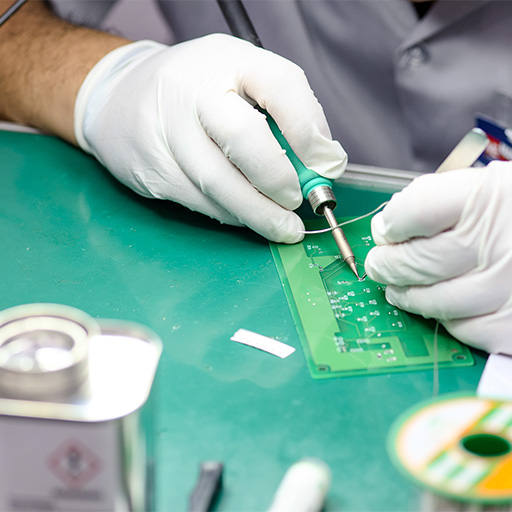
Semiconductors
Covers the theory behind semiconductor operation. Describes the characteristics and operation of various diodes and transistors. Stresses the importance of proper environmental conditions and explains how to minimize electrostatic discharge (ESD) and radio frequency interference (RFI). Discusses printed circuit board (PCB) and integrated circuit (IC) technology, including connection and replacement methods. Identifies kinds of semiconductor packages. Explains how to interpret manufacturers' spec sheets and how to analyze circuit performance by Q points and characteristics. This course has no prerequisites. Semiconductors is available in online technical training and course manual formats.
Lesson 1 - Introduction to Semiconductors
Topics:
Electron flow; Semiconductor materials, structure, and doping; Junction diodes; Diode characteristic curves and specifications; LEDs; Photoelectric devices
Learning Objectives:
– Discuss the basic structure of a semiconductor atom and the movement of free electrons and holes.
– Discuss the purification and doping of semi-conductors.
– Describe the p-type region, n-type region, and junction of a pn junction diode.
– Discuss the characteristic curves and specification ratings of a diode.
– Describe the operation of a light-emitting diode, a photoconductive device, and a photovoltaic device.
Lesson 2 - Environmental Conditions
Topics:
Temperature protection; Static electricity; Wrist straps; Line power conditioning; Radio frequency and electromagnetic interference
Learning Objectives:
– Discuss the importance of various environmental conditions to semiconductor operation.
– Discuss the effect of ESD on semiconductor devices and list several ways of preventing ESD in any work area.
– Discuss the requirements of a static-free workstation, and the proper techniques for using tools at the workstation.
– Describe ways to minimize ESD problems during packing and shipping.
– Explain how power conditioning prevents line power problems.
– Describe ways of preventing damage from radio frequency interference (RFI) and electromagnetic interference (EMI).
Lesson 3 - Printed Circuit Boards
Topics:
Materials for boards and conductors; Single-, double-sided, and multilayer PCBs; Mounting components; What is Solder; Soldering; PCB connectors
Learning Objectives:
– Discuss the advantages of PCBs over direct wiring.
– Explain why both flexible boards and rigid boards are used for printed circuits, and discuss the advantages and disadvantages of each.
– Explain how single-sided, double-sided, and multilayer boards are made.
– Describe the three classes of surface mount assemblies.
– Compare various soldering methods and discuss the advantages and disadvantages of each.
– What is Solder?
– Describe PCB connectors and mountings.
– Discuss PCB repair techniques and limitations.
Lesson 4 - Transistors and Integrated Circuits
Topics:
Transistor purpose and structure; Symbols; Performance curves; Transistor connections, characteristics, and specifications; ICs
Learning Objectives:
– Describe the differences between an npn transistor and a pnp transistor and identify the schematic symbol for each.
– Discuss transistor performance in the active region, saturation region, and cutoff region.
– Explain how the three kinds of transistor connections affect circuit values.
– Discuss four common transistor characteristics.
Lesson 5 - Packages and Performance Analysis
Topics:
Lead identification; Mounting components; Replacement methods; Maximum ratings; Transistor operating points; characteristics
Learning Objectives:
– Describe several kinds of semiconductor packages.
– Explain how to identify leads.
– Describe methods for mounting components on PCBs and chassis.
– Explain how to use manufacturers' data sheets.
– Discuss the analysis of circuits by Q points and by characteristics.
